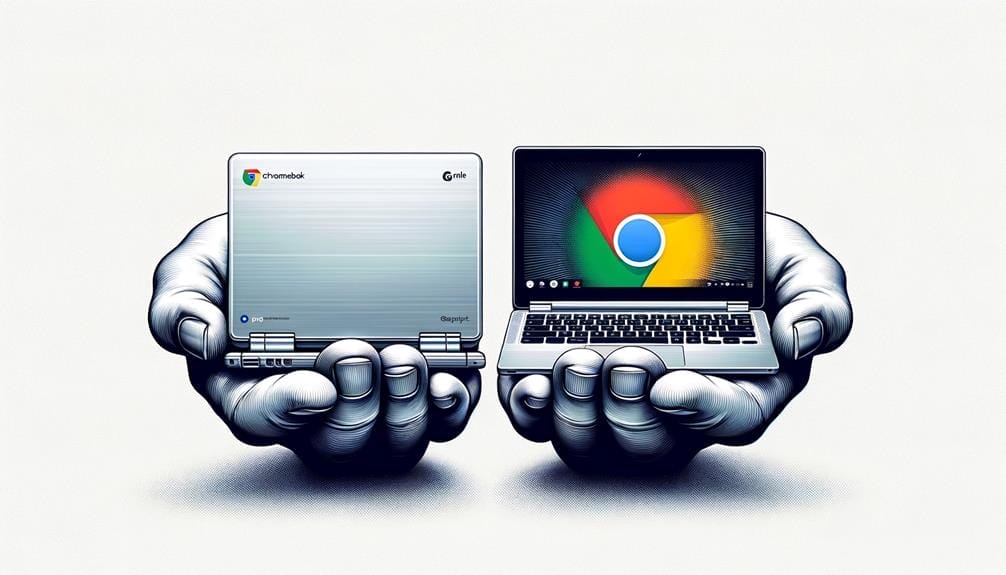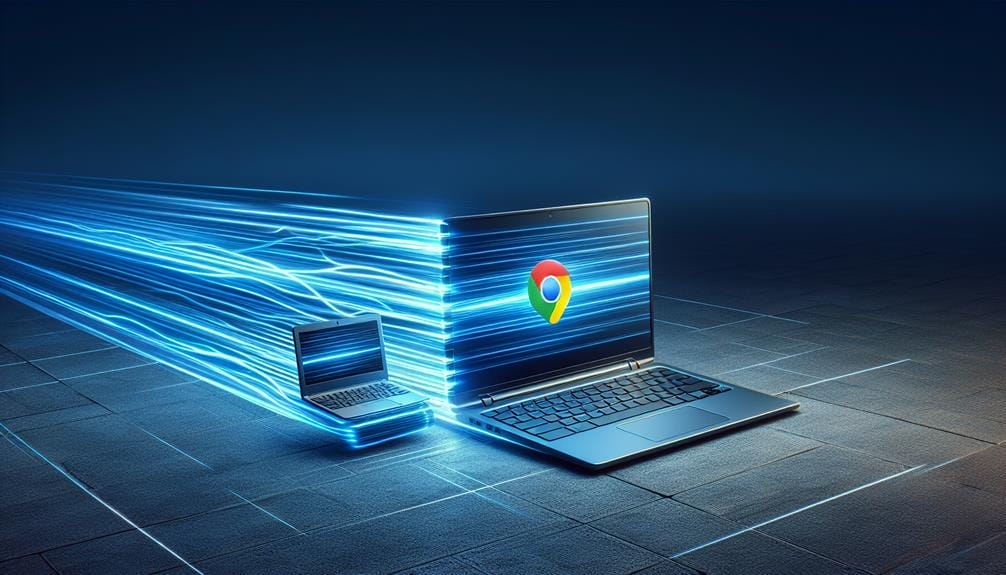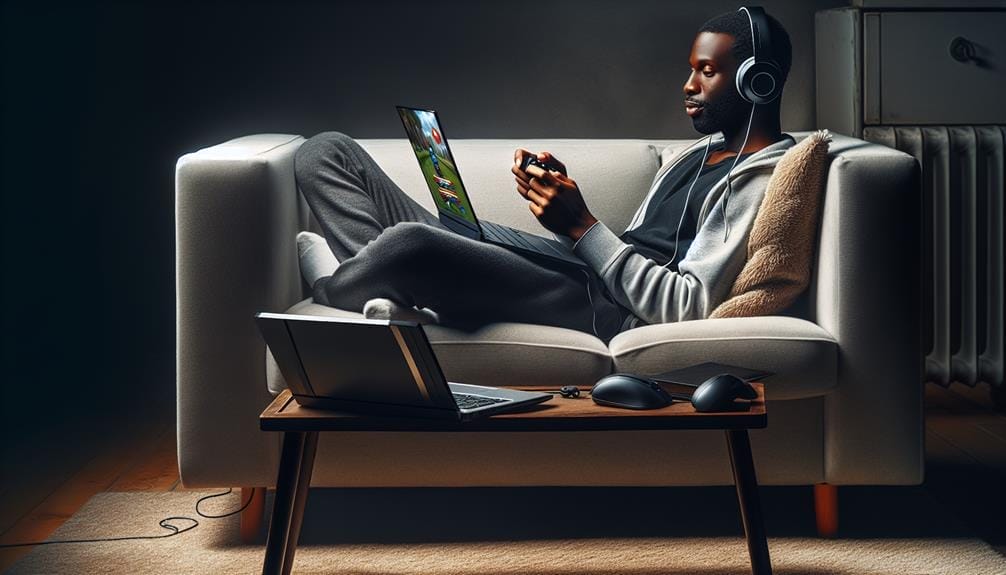Chromebook Vs Laptop: the Surprising Truth

With the swift progress of technology, choosing between a Chromebook and a conventional laptop has become increasingly intricate. Both options offer unique benefits and functionalities designed to meet varied preferences and needs.
While the debate surrounding these devices is multifaceted, a deeper examination of their surprising truths can provide valuable insights for prospective buyers. From security measures to performance capabilities, the Chromebook vs. laptop discussion delves into a myriad of considerations that warrant meticulous evaluation.
But what truly sets these devices apart and which one aligns better with your computing requirements?
Key Takeaways
- Chromebooks are more secure and streamlined than Windows-based laptops, making them a better option for the average user.
- Chromebooks have unique strengths and benefits for the average user, such as a simple operating system and better build quality.
- Chromebooks are suitable for undemanding users or those who primarily work within a web browser, but they may not be suitable for hardcore users or specific professional workloads.
- Chromebooks can replace desktops for regular computing tasks and are sufficiently capable for most users, especially beefier models.
Chromebooks: Streamlined and Secure

Chromebooks distinguish themselves in the market as devices with a streamlined and secure operating system, offering a user-friendly and robust computing experience.
When it comes to educational benefits, Chromebooks provide a seamless environment for students and educators to access educational resources, collaborate on projects, and manage assignments efficiently.
Additionally, Chromebooks boast robust data security features, including built-in virus protection and automatic updates that help safeguard sensitive student information. These security measures are pivotal in educational settings where data privacy and protection are paramount.
Furthermore, the streamlined nature of Chromebooks ensures that educational institutions can allocate resources efficiently while providing students with a user-friendly platform for learning and collaboration.
Comparison of User Capabilities
The streamlined and secure nature of Chromebooks in educational settings sets the stage for a comparison of user capabilities between Chromebooks and traditional laptops. When comparing user capabilities, it's essential to consider productivity and user experience.
| User Capabilities | Chromebooks | Windows Laptops |
|---|---|---|
| Productivity Comparison | Primarily web-based tasks | Versatile, feature-rich OS |
| User Experience Comparison | Simple, secure, limited versatility | More versatile, powerful OS |
When it comes to productivity, Chromebooks excel at web-based tasks, while Windows laptops offer a more feature-rich and versatile operating system. In terms of user experience, Chromebooks provide a simple and secure environment with limited versatility, whereas Windows laptops offer a more versatile and powerful operating system. Users must consider their specific needs and use cases when choosing between the two options.
Features and Limitations of Chromebooks

Featuring a light, fast, and cloud-centric operating system, Chromebooks offer a streamlined approach to computing that prioritizes efficiency and simplicity. The lightweight design of Chromebooks allows for quick boot-up and snappy performance, making them ideal for everyday tasks.
However, this streamlined design also comes with limitations, as Chromebooks offer limited versatility compared to Windows or macOS laptops. To address some of these limitations, Chromebooks can leverage Android and Linux apps to fill in some gaps, enhancing their functionality. Moreover, mid-tier Chromebooks with touch and stylus support are more versatile.
While modern Chromebooks can run Linux applications, setting it up may require some technical expertise. Despite these limitations, the lightweight design of Chromebooks provides a compelling option for users who prioritize speed and simplicity in their computing experience.
Chromebooks: Considerations and FAQs
When considering Chromebooks, it is important to address common considerations and frequently asked questions to make informed decisions about their suitability for specific user needs.
Chromebooks have an official expiration date for updates, leading to potential security risks and the possibility of certain applications no longer functioning after the expiration date.
Additionally, gaming on Chromebooks is limited, relying solely on game streaming and often resulting in overpriced and subpar gaming experiences compared to Windows-based laptops.
Understanding these limitations is crucial for individuals contemplating the purchase of a Chromebook, especially for those who require long-term security and performance for gaming purposes.
Chromebooks: Target Users and Capabilities

Target users and capabilities of Chromebooks vary significantly based on their lightweight, web-centric design and functionality. Chromebooks are particularly popular in the education sector due to their affordability, ease of use, and strong integration with Google's suite of productivity tools. They are suitable for undemanding users who primarily require web browsing, document editing, and email. Additionally, Chromebooks are ideal for users fully immersed in the Google ecosystem, as they seamlessly integrate with Google Drive, Docs, and other cloud-based services. The following table provides a concise overview of the target users and capabilities of Chromebooks:
| Target Users | Capabilities |
|---|---|
| Students | Affordable and easy to use |
| Professionals | Seamless integration with Google tools |
| Casual users | Web browsing and document editing |
Chromebooks Vs Traditional Laptops
The lightweight, web-centric design and functionality of Chromebooks, particularly popular in the education sector, make them an interesting point of comparison with traditional laptops. When considering Chromebooks versus traditional laptops, several key aspects come into play:
- Chromebooks for Education: Chromebooks are widely adopted in educational settings due to their affordability, ease of use, and seamless integration with educational software and platforms.
- Chromebooks for Business: In the business world, Chromebooks offer a secure and streamlined option for employees who primarily work within a web browser and cloud-based applications.
- Versatility and Performance: Traditional laptops may offer greater versatility and performance due to their feature-rich operating systems, making them more suitable for specific professional workloads and power users.
Both Chromebooks and traditional laptops have their unique strengths and limitations, and the choice between them ultimately depends on the specific needs and use cases of the user.
Chromebooks: Build Quality and Performance

In evaluating the build quality and performance of Chromebooks, it is essential to consider their construction and operational capabilities in relation to user requirements and industry standards.
Chromebooks are known for their durability and reliability, with many models featuring robust build quality that can withstand everyday use.
When it comes to performance and multitasking, Chromebooks have made significant strides in recent years. They are now capable of handling a wide range of tasks, from web browsing to running multiple applications simultaneously, thanks to improved hardware and optimized software.
However, it's important to note that high-end, premium Chromebooks tend to offer better performance and multitasking capabilities compared to entry-level models.
Chromebooks: Operating System and Applications
Chromebooks, renowned for their streamlined operating system, offer a unique and efficient platform for users' computing needs. When considering Chromebooks' operating system and applications, it's essential to address two crucial aspects: app compatibility and Chrome OS updates.
1) App Compatibility: Chromebooks initially had limited app compatibility, but they now support Android and Linux apps, enhancing their versatility. However, setting up Linux applications may require some technical expertise.
2) Chrome OS Updates: Chromebooks have an official expiration date for updates, after which they become less secure, and some applications may cease to function. It's important for users to consider this when investing in a Chromebook, especially for long-term use.
These factors play a significant role in the overall usability and longevity of Chromebooks.
Chromebooks: Gaming and Entertainment

For users seeking a comprehensive understanding of the gaming and entertainment capabilities of Chromebooks, it is essential to evaluate their performance and compatibility with various applications and services.
Chromebooks are known for their limited gaming performance compared to traditional laptops. While they can handle basic games and entertainment options available through the Google Play Store, their capabilities are restricted by the reliance on cloud-based or streaming services for more demanding gaming experiences.
In terms of entertainment, Chromebooks offer access to popular streaming platforms and web-based applications, providing a satisfactory experience for casual users. However, for those seeking high-performance gaming and a wider range of entertainment options, traditional laptops with more powerful hardware and a broader selection of native applications may be a more suitable choice.
Chromebooks: Price and Value Proposition
Following the exploration of Chromebooks' gaming and entertainment capabilities, a critical aspect to consider is their price and the value they offer to potential users.
Pricing Analysis: Chromebooks generally come at a lower price point compared to traditional laptops, making them an attractive option for budget-conscious consumers.
Value for Money Comparison: When comparing the features and performance offered by Chromebooks with their price, they often provide a compelling value proposition, particularly for users whose computing needs are met by web-based applications and services.
Long-Term Cost Consideration: Additionally, the lower initial cost and minimal maintenance requirements of Chromebooks contribute to their overall value for money, especially for users seeking affordable and hassle-free computing solutions.
In evaluating Chromebooks, it is clear that their pricing and value proposition offer distinct advantages for certain user demographics.
Conclusion
In conclusion, the comparison between Chromebooks and laptops reveals a range of features, capabilities, and limitations that cater to different user needs.
While Chromebooks offer streamlined and secure performance at a lower cost, traditional laptops provide a wider range of applications and higher performance capabilities.
Understanding the target users, build quality, operating system, and value proposition of both platforms is crucial for making an informed decision based on individual computing requirements.

